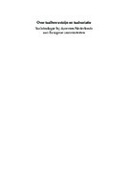Explore

Over taalbewustzijn en taalvariatie
Truus de Wilde
2019
0 Ungluers have
Faved this Work
Login to Fave
The study scrutinizes the effects of language awareness on teachers’ conceptualization of language variation. Teacher language awareness has been discussed mostly for the case of English and with regard to grammar, and is defined as being determined by knowledge and reflexion (Andrews 2008, Svalberg 2012). This study aims at examining the reach of the concept for other languages, here Dutch, and for other terrains, in this case, language variation, thus stretching the application also into the realm of language ideology. According to Kroskrity (2006, 2016), language ideologies are (1) not knowledge but ‘‘notions’, ‘beliefs’ or ‘ideas’, which (2) are about language, the role(s) of language and its nature, and which (3) are constructed by individuals and groups in interaction with each other to (4) rationalize and justify social relations. In this linguistic-ethnographic study, a qualitative analysis of semi-structured interviews with teachers of Dutch at eight European universities shows that knowledge and reflection play a considerable role for how teachers conceptualize language variation in class. Overall, four different types of teacher language awareness came to the fore, based on different interplays of both knowledge and reflection: standard language ideology alive, strong focus on prescription, doubting and linguistic insecurity and dynamic equilibrium. The overall results show the importance of teacher language awareness in language classes and help to boil down the vague notion of language awareness on language variation to two major defining factors, namely knowledge and reflection. Further, the study shows that language classrooms may be seen as ‘ideological sites’ (Silverstein (1979, 1998)), in which language ideology may be either reproduced or deconstructed, depending on the language awareness of the teacher. The consequences of the study for language teacher education are a plea for an informed, reflected, differentiated and integrative treatment of language variation in language class.
This book is included in DOAB.
Why read this book? Have your say.
You must be logged in to comment.
Editions

